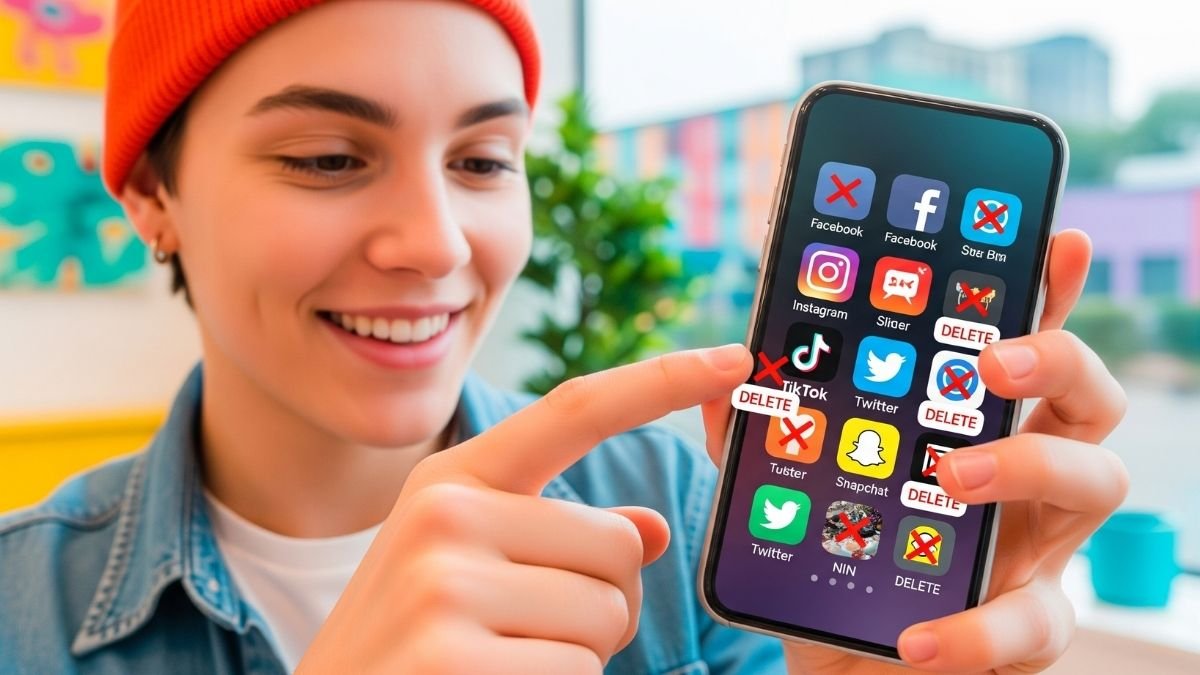
Have you noticed it too? That friend who disappeared from Instagram. The family member who stopped posting on Facebook. The colleague who’s nowhere to be found on Twitter.
If you’re wondering whether you’re having this mass exodus, you’re not. The numbers are wild: over 1 million people search “how to delete my Instagram account” every single month. Yet Instagram keeps growing.
Confusing, right?
Here’s what’s happening: We’re witnessing the biggest shift in how people use the internet since smartphones took over. It’s not just about “digital detox” anymore. People are getting smart about how these apps mess with their heads—and they’re finding much better alternatives.
Let me show you exactly what’s going down, who’s leaving, where they’re going, and why this matters way more than you think.
The Delete Button is Getting a Workout
Deletion Intent by Generation
Let’s start with some numbers that’ll blow your mind.
Instagram leads the “get me out of here” searches with 1.02 million monthly queries about deleting accounts. That’s roughly 12,678 searches per 100,000 people worldwide. To put that in perspective, that’s like a small city’s worth of people trying to escape every month.
But here’s where it gets interesting:
- Snapchat: 128,500 monthly deletion searches
- Facebook: 123,000 monthly searches
- Twitter/X: 49,000 monthly searches
The weird part? Most of these platforms are still growing their user numbers. So what gives?
It’s called “digital cognitive dissonance.” People want to leave, but they feel stuck. Sound familiar?
Think about it this way: How many times have you opened Instagram “just for a second” and found yourself scrolling for 30 minutes? Or felt that weird anxiety when you couldn’t check your phone? That’s not an accident—it’s by design.
Who’s Hitting Delete?
The patterns are fascinating. Gen Z is leading the charge, with 44% saying they’ve cut back on social media in 2024. But they’re not going offline—they’re just being way smarter about where they spend their time.
Millennials are doing something different. Instead of mindless scrolling, 53% are moving to creator-focused platforms like Substack. They want to choose what they consume, not have an algorithm decide for them.
Even more surprising? Baby Boomers are the most positive about social media, with 83.9% saying it improves their lives. Turns out, the people who grew up with these platforms are the ones most skeptical of them.
It’s Not Just About Mental Health (Though That’s Part of It)

Here’s what most articles get wrong: This isn’t just about people feeling bad after using social media.
It’s about people getting wise to the manipulation.
Remember when former Facebook VP Chamath Palihapitiya said social media was “ripping apart the social fabric of how society works”? He wasn’t being dramatic. He was describing exactly what he helped build—systems designed to capture and hold your attention at all costs.
The Real Psychology Behind the Exodus
Cal Newport (the guy who’s never had social media and somehow has a successful career) talks about something called “attention residue.”
Here’s how it works: Even when you’re not actively using social media, those apps create “open loops” in your brain. You’re thinking about that notification, wondering who liked your post, or mentally composing your next update.
This constant background noise can cost you up to 40% of your mental capacity. No wonder people feel exhausted!
But there’s something even more interesting happening. People are experiencing what researchers call “identity performance fatigue.”
You know that feeling when you post something and immediately start worrying about how many likes it’ll get? Or when you’re at a restaurant and you’re more focused on getting the perfect shot than enjoying your meal?
That’s your brain telling you something’s off.
The Authenticity Problem
Here’s the catch-22 that’s driving people crazy: Social media platforms tell you to “be authentic,” but their algorithms reward fake, performative content.
The result? Constant psychological tension.
You want to share real moments, but the platform pushes you to create content that’s designed to go viral. You want genuine connection, but you’re stuck in what Dr. Sherry Turkle calls the difference between “connection” and “conversation.”
Social media gives you lots of shallow connections but makes real conversation harder. Ever notice how it’s easier to text someone than call them now? That’s what she’s talking about.
Where Everyone’s Going (And It Might Surprise You)
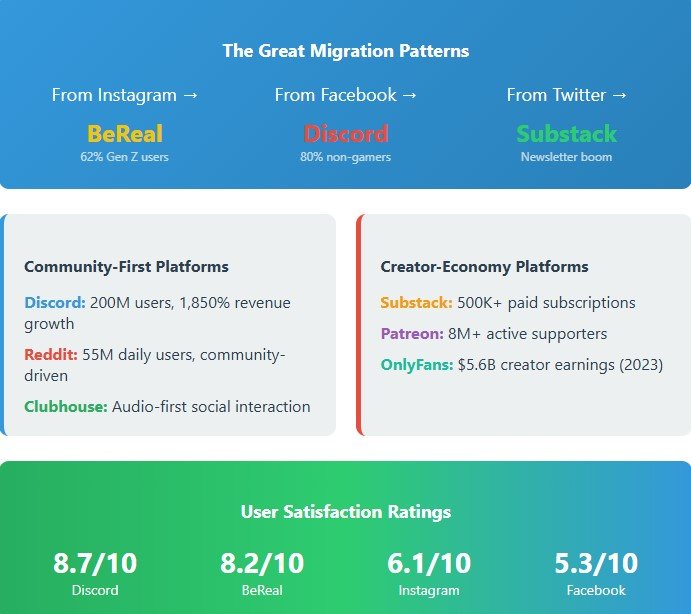
So if people are leaving the big platforms, where are they going? The alternatives tell a really interesting story about what people want from their online lives.
Discord: The Anti-Social Social Network
Discord hit 200 million monthly users and grew revenue by 1,850% since 2019. But here’s the kicker: 80% of users aren’t even gamers anymore.
Why is Discord winning? Because it’s the opposite of what makes traditional social media toxic:
- No algorithm decides what you see
- Private servers where you know the people
- Voice chat that feels like hanging out
- Communities built around shared interests, not follower counts
It’s social media that feels… social.
BeReal: The Instagram Killer?
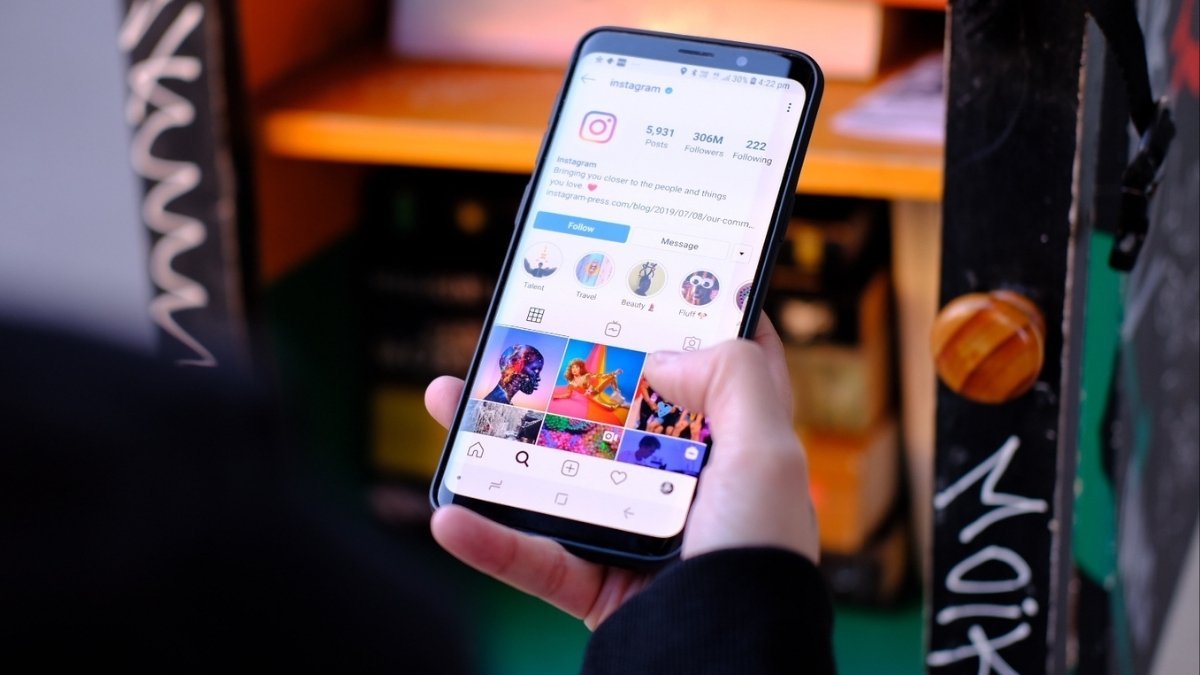
Remember when Instagram was about sharing real moments? BeReal is trying to bring that back with 25 million daily users and 300% growth in 2022.
The concept is genius: You get a random notification, and you have 2 minutes to post a photo using both your front and back camera. No filters, no planning, no perfect lighting.
80% of users are Gen Z, and they’re loving the authenticity. It’s like social media before everyone became a brand.
The Newsletter Renaissance
Here’s something that would’ve sounded crazy five years ago: Email newsletters are cool again.
Platforms like Substack are exploding because people want to choose what they read instead of having an algorithm shove content at them. It’s intentional consumption instead of mindless scrolling.
Think about it: When’s the last time you wanted to see everything in your Instagram feed? With newsletters, you’re choosing to follow specific creators because you genuinely want their content.
The People Who Built These Apps Are Telling You to Leave

This is where things get interesting. The harshest critics of social media aren’t random activists—they’re the people who built these platforms.
Sean Parker, Facebook’s first president, now calls it a “social-validation feedback loop” designed to exploit human psychology.
Jaron Lanier, who’s been in Silicon Valley since the 1980s, puts it even more bluntly: “Social media isn’t about facilitating social exchanges. It’s about behavior modification.”
These aren’t outsiders trying to kill the industry. These are insiders who made millions from these platforms and are now telling you they’re harmful.
Even more telling? Many of them don’t use social media at all. Cal Newport is a computer science professor with zero social media presence who has written bestselling books and has a successful career.
If the people who understand technology best aren’t using these platforms, what does that tell you?
Some Big Names Are Walking Away (And Thriving)
High-Profile Departures
Post-Departure Outcomes
Companies That Thrived After Leaving
Alternative Marketing Performance
Tom Holland, with 67 million Instagram followers, publicly announced he was taking a break for his mental health. He called the platforms “overstimulating” and “overwhelming.”
The result? Massive positive media coverage and support from fans. Leaving social media is becoming a power move, not social suicide.
Even companies are figuring this out. Lush Cosmetics left all major platforms in 2021, saying they were tired of environments that “keep you hyper-tense, engaged and anxious.”
Their sales didn’t tank. They got praised for taking a stand.
Bottega Veneta (the luxury fashion brand) deleted its social media and created its digital magazine instead. Creative Director Daniel Lee said he wanted “something joyful instead” of “playground bullying on social media.”
The Business Case for Leaving
Here’s something that should make every business owner pay attention: Social media marketing budgets have dropped from 17% to 11% of total marketing spend—the lowest in seven years.
Companies are realizing that social media isn’t the marketing goldmine it used to be. Engagement rates are dropping, algorithms are getting harder to crack, and people are getting better at ignoring ads.
Meanwhile, retail media (think Amazon ads) is expected to overtake TV advertising by 2028.
The Economic Earthquake You’re Not Hearing About

The money numbers tell a crazy story about how fast things are changing.
Twitter/X lost 79% of its value after Elon Musk’s takeover—dropping from $44 billion to $9.2 billion. The platform is bleeding advertisers and users while facing $1.2 billion in annual debt payments.
Snapchat’s stock fell 88% in 2024, despite maintaining strong teen engagement. Investors are nervous about the long-term future of social media advertising.
Even Meta (Facebook’s parent company) had its first-ever quarterly revenue decline and lost 500,000 daily active users for the first time in its history.
The platforms know they’re in trouble. That’s why Meta is betting everything on the metaverse (spending $13.7 billion in 2022 alone) and why every platform is desperately copying TikTok’s features.
What This Means for Your Future Online Life
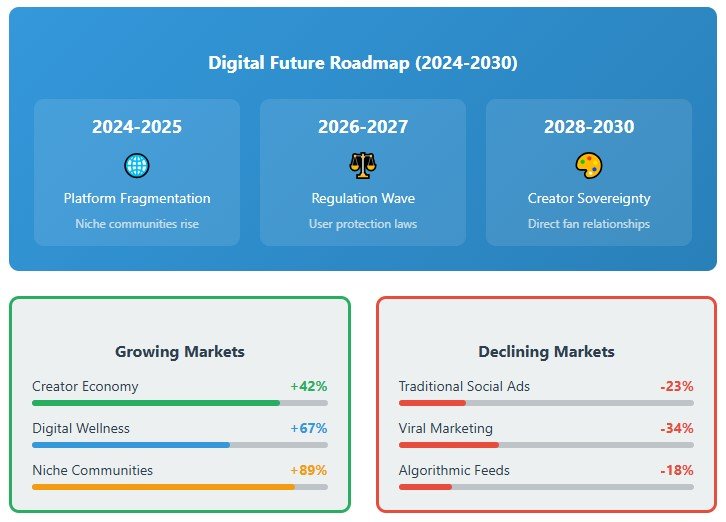
Here’s what I think is coming next, based on all this research:
Platform Fragmentation
The days of one or two platforms dominating everything are ending. We’re moving toward a world of specialized, smaller communities built around specific interests and values.
Think Discord servers, Substack newsletters, and BeReal friend groups instead of trying to maintain one massive social media presence.
Creator Independence
The creator economy is exploding as people realize they don’t need platforms to build audiences. Direct relationships between creators and fans (through platforms like Patreon, Substack, and OnlyFans) are becoming more valuable than viral moments.
Regulation Reality
New York City is suing major platforms for “fueling the youth mental health crisis,” and the U.S. Surgeon General wants warning labels on social media.
Translation: The free-for-all days are ending. Platforms will have to prioritize user well-being over engagement, which fundamentally changes their business models.
The Most Surprising Truth About Social Media Deletion
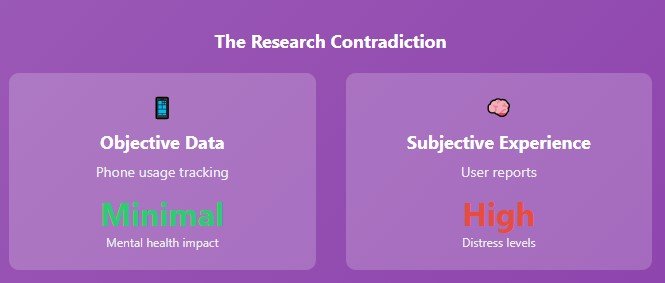
Here’s the thing that surprised me most in researching this: When researchers actually measure social media usage objectively (instead of asking people to estimate), the mental health effects are tiny or non-existent.
So why are people still leaving?
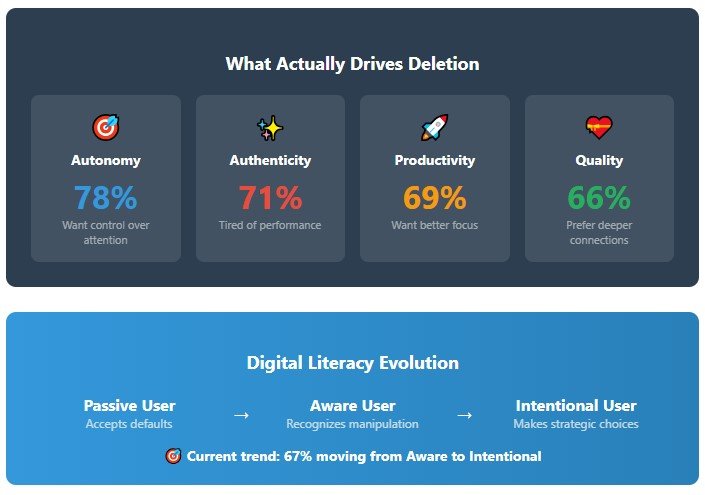
Because it’s not really about measurable harm. It’s about autonomy and intentionality. People want control over their attention instead of having algorithms decide what they see and when they see it.
It’s about wanting authentic relationships instead of performance metrics.
It’s about choosing quality over quantity in digital interactions.
What You Can Do Right Now
30-Day Digital Transformation Plan
Quick-Start Alternative Guide
You don’t have to delete everything tomorrow, but here are some moves that can make a huge difference:
Start Small
- Turn off all non-essential notifications
- Remove social media apps from your home screen
- Set specific times for checking platforms instead of constant scrolling
Try Alternatives
- Join a Discord server about something you’re genuinely interested in
- Subscribe to a few newsletters from creators you actually want to follow
- Use BeReal if you want authentic social sharing without the algorithm
Audit Your Digital Diet
Ask yourself: Does this platform make me feel good? Am I learning something valuable? Am I connecting with people I care about?
If the answer is no, why are you there?
Build Real Connections
Instead of broadcasting to everyone, focus on maintaining relationships with people who actually matter to you. Text friends directly. Make actual plans. Have real conversations.
The Bottom Line: You Have More Power Than You Think
Here’s what all this research really shows: You’re not crazy for feeling weird about social media. The platforms are designed to be psychologically manipulative, and more people are recognizing that every day.
The good news? You have way more control than you think. You can choose where to spend your digital time. You can prioritize authentic connection over algorithmic engagement. You can build a digital life that actually enhances your real life.
The great social media migration isn’t about going backward—it’s about moving toward something better.
The question isn’t whether you should delete your social media accounts. The question is: What kind of digital life do you actually want?
Once you figure that out, the rest becomes a lot clearer.
What’s your experience been with social media lately? Are you feeling the pull to try something different, or are you happy with how things are? Let me know—I’d love to hear your thoughts on where all this is heading.






